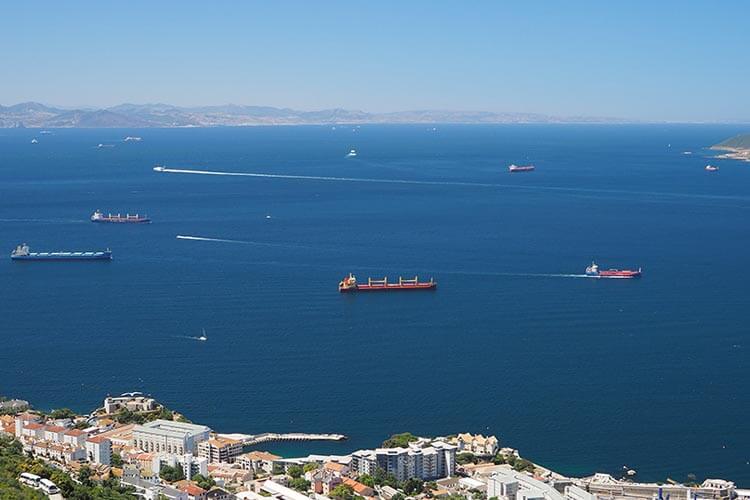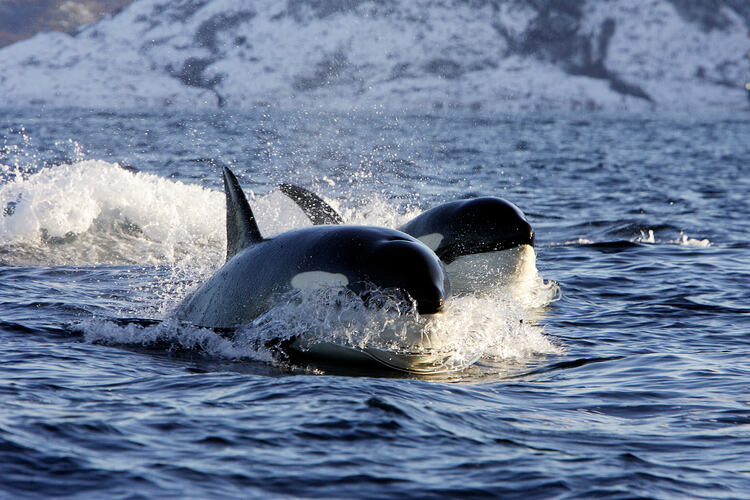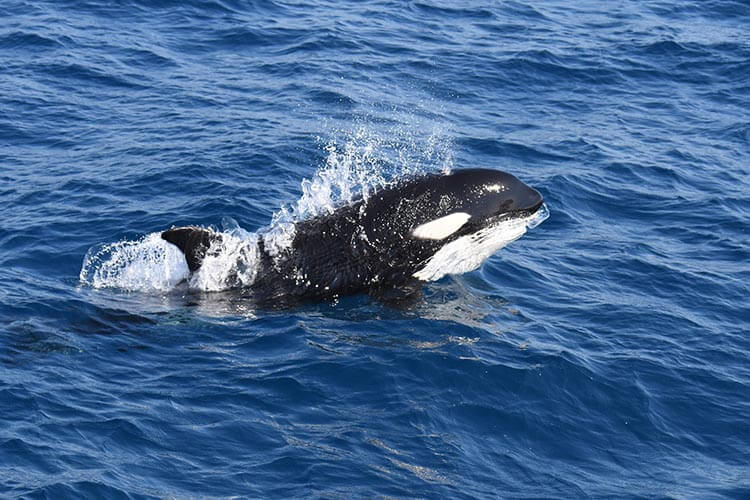
Experts say an orca known as ‘White Gladis’ may be attacking and damaging vessels after being traumatised by a boat injury, triggering a behavioural change that other orcas are imitating
A 2022 study has shed light on the reasons why orcas (killer whales) have been attacking boats in the Strait of Gibraltar, with researchers theorising that the incidents began after a vessel injured a female orca named White Gladis.
Since the attacks began in 2020, three boats have been sunk and more than 250 damaged by a group of orcas, with the animals appearing to deliberately target the vessels’ rudders.
Of the 35 killer whales in the region, 15 are reported to have been involved in the highly unusual interactions, which experts think began after White Gladis’ behaviour altered in a ‘defensive’ fashion after she suffered a ‘critical moment of agony’ involving a boat collision or illegal fishing entrapment – leading to other orcas damaging passing vessels in response.
A study published in June 2022 in the journal Marine Mammal Science has found that assaults by the orcas are directed mainly at sailing boats. There is a clear pattern of orcas striking the rudders, with spade rudders the most targeted and damaged type, and then losing interest once the boat has successfully stopped.
The general movement of the orcas involved in the incidents was from the Strait of Gibraltar to Galicia in northern Spain, with at least one of the groups returning to southern Portugal.
Related stories
- Life Changing: Todd Thimios’ stunning Norway orca photography
- 57-year-old orca held captive in Florida aquarium to be released
- Orca adopts – or kidnaps – pilot whale calf
- Stunning footage of orcas killing great whites
- Spate of great white deaths confirm predation by orcas

Understanding why orcas are damaging boats
After analysing over 47 testimonies, 110 pictures, and 69 videos, the study theorises some motivations that the orcas had to interact with vessels: a ‘punctual aversive incident’ such as collision with a vessel; the natural curiosity of the animals; or pressures already identified for killer whales such as prey depletion, boat disturbance and interaction with fisheries.
The study also considered how orcas – which are known to possess high cognitive abilities – are easily able to reproduce behaviour via social learning. In previous studies, the use and transmission of hunting techniques have been investigated in this particular subpopulation of orcas, leading to concerns from researchers that more orcas will eventually learn this new behaviour, aggravating the situation.
But co-author of the recent study, Alfredo López Fernandez, a biologist at the University of Aveiro in Portugal and representative of the Grupo de Trabajo Orca Atlántica (Atlantic Orca Working Group), said it isn’t as simple as White Gladis ‘teaching’ other orcas to retaliate in the wake of her boat injury.
‘We do not interpret that the orcas are teaching the young, although the behaviour has spread to the young vertically, simply by imitation, and later horizontally among them, because they consider it something important in their lives,’ López Fernandez said.
The orcas’ unusual behaviour could also be seen as a ‘fad’ – a temporary behaviour started by one orca and picked up by others before being abandoned.

According to Lòpez, it appears that orcas believe that the behaviour is advantageous, despite the risks associated with swimming near operating boats. Since these interactions first appeared in 2020, 4 orcas have died, although the deaths cannot be directly linked to the orcas’ encounters with boats.
The timeline of orca incidents
‘The reports of interactions have been continuous since 2020 in places where orcas are found, either in Galicia or in the Strait,’ said Lòpez-Fernadez.
Initially, the interactions baffled both researchers and recreational boat users. Rocío Espada, one of the study’s co-authors, who works with the marine biology laboratory at University of Seville and has observed orcas for years in the Strait of Gibraltar, explained her initial reaction to the orcas’ new behaviour.
‘For killer whales to take out a piece of a fibreglass rudder is crazy,’ Espada said in a 2020 interview with the Guardian. ‘I’ve seen these orcas grow from babies, I know their life stories, I’ve never seen or heard of attacks.’
One of the first reported attacks by orcas on a boat in the Strait of Gibraltar was in July 2020, when orcas rammed the hull of a boat that researcher Victoria Morris was crewing for over an hour, leaving the vessel without steering. In the same year, couple Beverly Harris and Kevin Large were motor-sailing their 50ft boat when orcas began to spin the vessel.
The latest of the three sinkings occurred on 4 May, when German skipper Werner Schaufelberger’s boat was so severely damaged by the orcas that it sank while being towed to safety by the Spanish coastguard.
In June, British sailor Iain Hamilton was marooned for several days after the rudder of his boat, the Butey of Clyde, was destroyed by five orcas off the coast of Gibraltar.
The difficult life led by Gibraltar orcas
A 2011 census of recorded 39 individuals in the Gibraltar orca subpopulation, which today, with 35 members, is classed as Critcally Endangered by the IUCN Red List of threatened species due to a number of factors, including pollution, fishing, food scarcity and sustained injuries.

Orcas are drawn to the area due to the presence of bluefin tuna, a fish also highly-prized by humans, leading to a complex interaction between fishers, orca and tuna. The interaction is often dangerous to the orcas, which are known to ‘steal’ fish from drop lines, resulting while in serious hook injuries to their dorsal fins.
The narrow Strait of Gibraltar is also both a major shipping route and huge draw for whale-watching tours due to the presence of the orcas – leading to the constant threat of boat strikes from the heavy marine traffic.
The future of Gibraltar orcas
The researchers behind the 2022 study into why killer whales are attacking boat traffic in the Strait of Gibraltar are concerned of the potential impact that this behaviour may have on both orcas and mariners.
‘If this situation continues or intensifies, it could become a real concern for the mariners’ safety and a conservation issue for this endangered subpopulation of killer whales,’ the researchers wrote.
‘There is an urgent need to conduct dedicated research that would help better understand the behaviour of the animals and implement mitigation measures.’
The complete study, ‘Killer whales of the Strait of Gibraltar, an endangered subpopulation showing a disruptive behavior,’ by Ruth Esteban, Alfredo López et al is published in Marine Mammal Science
- Orca attacking adult whale shark to eat its liver - 3 August 2023
- ‘The Deepest Breath’ freediving documentary on Netflixnow - 28 July 2023
- Freediver bitten by oceanic whitetip shark - 27 July 2023


